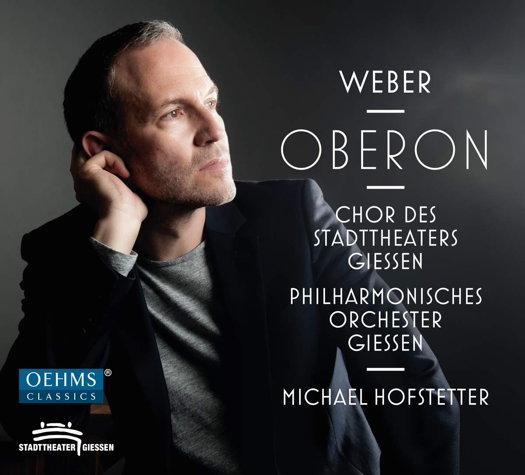 SPONSORED: Ensemble. Melting Rhapsody - Malcolm Miller enjoys Jack Liebeck and Danny Driver's 'Hebrew Melody' recital, plus a recital by David Aaron Carpenter.
SPONSORED: Ensemble. Melting Rhapsody - Malcolm Miller enjoys Jack Liebeck and Danny Driver's 'Hebrew Melody' recital, plus a recital by David Aaron Carpenter.
All sponsored features >>
 DISCUSSION: John Dante Prevedini leads a discussion about Composers, individuals or collective?, including contributions from David Arditti, Halida Dinova, Robert McCarney and Jane Stanley.
DISCUSSION: John Dante Prevedini leads a discussion about Composers, individuals or collective?, including contributions from David Arditti, Halida Dinova, Robert McCarney and Jane Stanley.

Full of Surprises
Michael Hofstetter's recording of Weber's 'Oberon',
recommended by GERALD FENECH
'Recommended ... if only for the
magical sound world created by Hofstetter.'
Born in 1786, five years before Mozart's death, and living until 1826, one year before Beethoven's death, Carl Maria von Weber's musical legacy is deeply rooted in the ethereal melody of the former and the dramatic intensity of the latter. Indeed, these two contrasting elements make Weber's music so exciting to listen to. Famous for his operas and clarinet music, Weber was an all rounder, and despite his short life, his output encapsulates practically all musical genres of the times. Still, his popularity lies mainly with his stage-works, and rightly so, he is considered to be the father of German Romantic opera, influencing composers such as Marschner, Meyerbeer and of course Wagner. Not least, Weber was a highly competent conductor, pianist, guitarist and critic.
His three blockbuster operas, Der Freischutz (1821), Euryanthe (1824) and Oberon (1826) were all groundbreaking works. The first came to be regarded as the first German national opera, the second developed the Leitmotif technique to an unprecedented degree, and the last was not only a precursor to Mendelssohn's music to A Midsummer Night's Dream but also revealed the composer's lifelong interest in the music of non-Western cultures. Other attributes of this wondrous composer were music journalism, interest in folksong and lithography to engrave his own works.
Early in 1826, Weber's financial position was anything but healthy. Against his doctor's advice, he accepted a commission from Covent Garden for a new opera. He travelled to London in poor health to complete the music, learning English to be better able to follow the libretto. Sadly, the pressures of rehearsals, social engagements and composing extra numbers destroyed his health. Weber died in London on 5 June 1826 leaving the opera unrevised, something he would have dearly loved to accomplish. Oberon, or 'The Elf King's Oath', was premiered on 12 April 1826 to an English libretto by James Robinson Planché after a poem by Christoph M Wieland, which itself is based on the epic romance Huon de Bordeaux, a French medieval tale. The story is one of love and reconciliation against a backdrop of the Orient, Middle Ages and Wolf's Glen Romanticism. The premiere was a triumph, but sadly, the piece no longer commands a regular place in the repertoire. A pity, because the music is overwhelmingly beautiful and full of surprises.
Listen — Weber: Vision (Oberon Act I)
(CD1 track 4, 0:00-0:41) © 2016/2019 OehmsClassics Musikproduktion GmbH :
This 2016/17 live recording from Giessen has many welcome plusses, not least conductor Michael Hofstetter's choice to interpret the work on period instruments.
Listen — Weber: Preghiera (Oberon Act II)
(CD2 track 2, 0:00-0:41) © 2016/2019 OehmsClassics Musikproduktion GmbH :
The performance is fine, with attentive and committed singing by all the team, while the orchestra plays the score with confidence and elan.
Listen — Weber: Act III Finale (Oberon)
(CD2 track 10, 2:32-3:28) © 2016/2019 OehmsClassics Musikproduktion GmbH :
The Oberon discography is thin indeed, so this latest venture is most welcome. Sound and presentation are highly acceptable, but information on the piece leaves one rather dry. Recommended nonetheless, if only for the magical sound world created by Hofstetter.
Copyright © 9 August 2019
Gerald Fenech,
Gzira, Malta

CD INFORMATION - WEBER: OBERON


